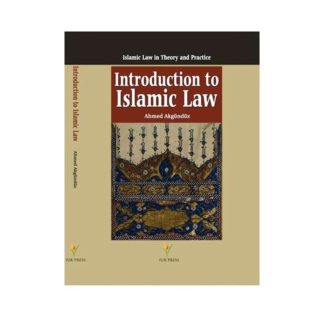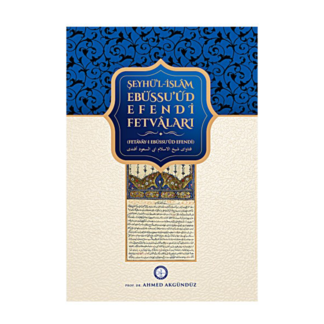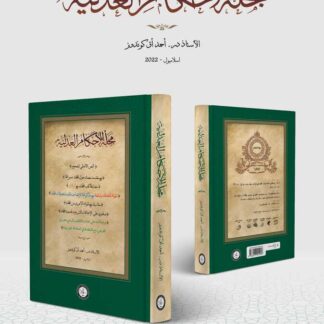Description
The Ottoman Civil Code, which is mentioned briefly as “Al Majalla” and its full name: “Majlah of Al-Aḥkām Al-‘Adliyah,” also called: “Al-Aḥkām Al-‘Adliyah,and Europeans call it “Royal laws regarding the state’s broadcasting of legal rulings and the legal rulings in the books of jurisprudence.” And assets in legal templates, based on the authority of the legal guardians to put the legal rulings in the form of binding laws. The word “Majallah”, and in the Turkish sense in particular, suggests the selection and collection of various issues between two covers. We do not find in the Majalla rulings that contradict the Sharia, rather we do not find in them rulings other than the Hanafi school of thought, with the exception of a few exceptions in which they depended on the jurisprudence of the four schools. The Majalla is nothing but a legal formulation of 1851 articles of the legal rulings transmitted in the book “Multaqā al-Abḥur”, which has been a legal reference for centuries, and in references to jurisprudence and fatwas.
The head of its committee and its engineer, Ahmed Jawdat Pasha, described it and said: “The Majalla called Judgment of Justice, a complex of corrected issues, and a collector of revised branches. Superior, or it is the treasury of facts, and this is the treasure of the minutes, rather the introduction is a summary, and the issues are detailed, as if they are a mirror and the issues are their representations, as all that is in the chapters and the principles are included under these principles, so whoever mastered the principles almost appears on all the branches”.
And in your hands, dear reader, is a book that contains between its two covers the most important issues of financial contracts that Muslims need in their dealings, straight on the approach of the Qur’an and Sunnah, and the jurisprudence of scholars of the religion, well-known by researchers, and needed by educated students, and judges and legal scholars cannot do without it. A boycott of the commitment of Islamic countries to the legal laws in the period of the Ottoman Empire, and that their civil laws did not depart from Islamic law, although many secularists and modernists tried to distort the words from their places.
Since my childhood, I have directed my interest to consider the Islamic legal laws in force since the inception of the Ottoman Empire until the era of the Tanzimat and what followed. The Ottoman Empire in all stages of the state, and over the various periods of its sultans, and it was published in the Turkish language, and this year I published the first volume of it translated into Arabic. The Ottoman Empire did not write for it, as it came to the door of its fall and the beginning of the republican era, and it was published in three volumes, in which the articles of personal status were mentioned, appended at the end of each of them with the texts of the jurisprudence books and the legal sources for these articles. I have also shown in numerous studies some partial laws such as the tax law in the Ottoman Empire, and the law forbidding intoxicants.
We have made new additions to this publication in this edition
Because of the legality of the Majlah of Al-Aḥkām Al-‘Adliyah, as it became due to the sultan’s order the legal law to which judges refer, and the teaching material in law faculties, in addition to the original origin and that it is an extension of the provisions of Islamic jurisprudence in the Book of Transactions, and the spread of the Islamic world in which the Majalla became the original reference in it, even after the fall of The Ottoman Empire, has issued so many editions of it, that it is difficult to enumerate them, d-ue to the overlapping of its times, and between some of the official editions the difference was days, not years. The Majalla, as is well known, was originally written in the Ottoman language, and then the introductions, the book of sales, and the rental book were officially translated from it. After that, it was translated into Arabic by several sides, and the texts of these translations differed slightly, which did not change the content, although it differed by clarification in some of them, and the error appears in translating parts of some materials, without affecting the doctrinal content. We also noted that the translations of the original concern to edit the meaning and transfer it to Arabic correctly, some translations differed in the introduction and delay of some words in the materials.
Taking these matters into consideration, we have chosen in this edition to publish the first original text issued by the Majalla, which was issued in the form of different books, each of his sixteen books separate from the other book, so that at the end of each part it was sent to Diwan Himwan It is presented to the Sheikhdom of Islam, in order to be approved, and it was approved and published and approved. After its completion, it was collected in one book and published in full.
We compared the entire book with more than one of the first editions of the book, in addition to some later editions, and some translated and published texts within the annotations of the printed Majalla. Relying on the original text, we found that the book in it the introduction and the first book were translated into Arabic by the Majalla committee, or under its supervision, and then he wrote in the Ottoman language. And in the sixth book in the original version, the first text that was written during the absence of Ahmed Jawdat Pasha from the Majalla committee was published, so we changed this section to the later versions, because this text was greatly modified by Ahmed Jawdat Pasha, and those editions were under his consideration when published.
It is worth noting that some of the terms or words mentioned in the Majalla’s materials were among the terms used and known at the time, and we have tried to keep them as they are as possible. The reason for this is that it is also in the original translated text.
New additions in this edition:
First: I found, by searching the Ottoman archives for a long time, that explanatory notes were placed at the beginning of each chapter of the Majalla, but they were not published, so we published what we found in the archive, and put it in its place at the front of each chapter.
Second: Adding the amendments that were written to the Majalla, which were officially published in the official Majalla, after they were approved and approved in the Humayun handwriting. It was published in the Ottoman language. It is very surprising that it was never published in Arabic, despite some researchers’ references to it. In 2013, I published it in Turkish, and in this bulletin I translated these amendments with their explanatory notes and the reasons for their amendment, which were issued by the same committee, translated into Arabic.
Amendments, together with their explanatory notes, and the reasons for their modifications are written in blue.
I added the articles of amendments within the articles of the Majalla, after the original article in red, and what was canceled from the articles I wrote after the original article that it was canceled.
In translating the lists of “adjustments (ta’dīlāt)” containing the discussions and materials that have been modified, we translated the original as much as possible, due to the difficulty of Ottoman legal expressions, but we preserved the meaning and did not lack anything from it.
Third: Adding some important legal materials, which were approved but not published in the Majalla’s text, which are materials related to legal bonds, which we referred to previously.
Fourth: Because the Majalla did not write a book on the provisions of the loan, and its provisions were of great importance, and the legal scholar Ali Haider added it in his explanation in the form of legal articles, we decided to add it to the Majalla, and we put it under the name of the seventeenth book, and I presented him with a study On an important issue in the loan related to murabaha, in which missteps occurred, and because of which the secularists accused the Ottoman state of permissibility of usury, this issue was clarified in the introduction to the seventeenth book. We also indicated additions to Haider in green.
Fifth: We have added some of the examples mentioned by Ahmed Jawdat Pasha in one of the publications he made, to the Majalla’s materials, and we wrote them in small letters. Ahmed Jawdat Pasha said:
Notice: “Within the context of explaining and clarifying the basic and naive issues included in this Majalla, we saw that it is necessary and necessary to take some issues from the fatwa books and include them in them. It was differentiated from the basic issues by printing in small letters.
Sixth: We have adjusted the Majalla in the form, to make it easier to read, but due to the difficulty of the matter, there may be some few errors, which we hope will be corrected, if any, in the next editions of this book.
Seventh: After each article, we put the numbers of the Majalla articles related to it and wrote them in a separate line (see the Majalla). As for the aforementioned with the original text, we left it in its place.





